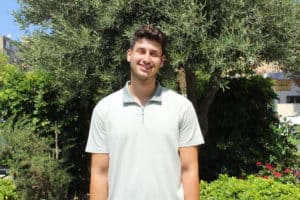-
26 April 2024
A reflection from Snir Holtzman, Federation Shaliach (Israeli emissary) to Temple Emanuel
 “This joy mixed with sadness, is, in a way, the essence of Israeli life.”
“This joy mixed with sadness, is, in a way, the essence of Israeli life.”
Time moves faster than we think. It’s already April, and in a blink of an eye, it’ll turn into May. Sometimes, October 7th feels so far away and, sometimes, it feels like it was just yesterday. Sometimes it feels like a horror movie; something that was just a bad dream. And sometimes, you can feel your body turn upside down from just hearing about it. But the clock is still ticking, and the seasons change. Here in Washington DC in October, the leaves became orange and fell on the ground. Today, the cherry blossoms bloomed and disappeared. Summer will come soon enough, and then winter, and back again.
The arrival of warmer weather and the flowers and trees blossom also means the Israeli Yoms (Yom Hazikaron, National Remembrance Day, and Yom Haatzmaut, Israeli Independence Day) are approaching. Growing up, I was confused around this time of the year. We are supposed to be sad while spring is at its peak. We are supposed to mourn, but the day after Yom HaZikaron is Yom HaAtzmaut, which is essentially the biggest party of the year. How does it work?
I then remembered the sentence one of my beloved teachers once told me: “The Israeli Yoms embody the idea of משואה לתקומה (Mi’Shoah Le’Tkuma), which means “from the dark days of the Holocaust we move to rebirth and resurrection.” I understood why it is so important to remember the ones that made the ultimate sacrifice right before we celebrate the Jewish State’s independence. This joy mixed with sadness is, in a way, the essence of Israeli life.
This year, the Yoms will look, feel, and affect us in a completely different way. As an Israeli, every year punches you in the gut. You hear stories and meet people, and deep down you can’t believe that it can get any worse.
Until it does.
October 7th brought so much pain and disbelief. It caught us completely by surprise. And as we try to rebuild ourselves from the scraps, it’s hard to process and comprehend the measures of destruction and loss.
It’ll be harder to make that transition this year. This is when we have to be strong; the clock is still ticking, and those we’ve lost wouldn’t want us to stop living our lives. They would want us to celebrate them — who they were and the life they had. It is our right to celebrate the people of Israel, those who sacrifice everything, and celebrate love.
We will not forget what happened; we will never forget. We won’t forget our brothers and sisters being held captive in torture chambers in tunnels underneath Gaza.
In the Tanach (Hebrew Bible), the word אהבה (Ahava; Love) appears 40 times and the root of that word (א.ה.ב) is mentioned 208 times. שנאה (Sin’a; Hatred) appears only 17 times. This is how we’ll win this. Together, with love. We will dance again. We will rise bigger and better than ever, because this is who we are, this is what we do, this is the true meaning of Am Israel Chai (The people of Israel live).
I will celebrate this year for my friends, for my family, for my brothers and sisters on the front lines working day and night so we can have a Jewish state, so we can be free people in our homeland, so we can live.
I will celebrate to show the world that nothing can put us down.
Time is still moving, and I hope that by the time you read this, the hostages will be back home and the war will be over. Time is still moving, and I know that we are here to stay. Trees will shed their leaves and flowers will bloom, and we’ll still be here, no matter what they throw at us.
!עם ישראל חי
(The people of Israel live).
